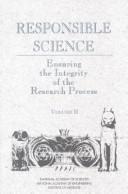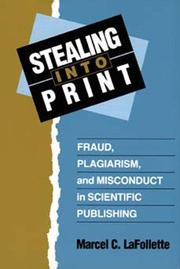| Listing 1 - 6 of 6 |
Sort by
|

ISBN: 0585021759 9780585021751 0309045916 Year: 1992 Publisher: Washington, D.C. : National Academy Press,
Abstract | Keywords | Export | Availability | Bookmark
 Loading...
Loading...Choose an application
- Reference Manager
- EndNote
- RefWorks (Direct export to RefWorks)
Research --- Responsibility. --- Accountability --- Moral responsibility --- Obligation --- Ethics --- Supererogation --- Research ethics --- Moral and ethical aspects. --- Responsibility --- Ethics, Professional. --- Research. --- Scientific Misconduct. --- Recherche --- Responsabilité --- Moral and ethical aspects --- Aspect moral
Book
ISBN: 3839459664 3837659666 Year: 2022 Publisher: Bielefeld transcript Verlag
Abstract | Keywords | Export | Availability | Bookmark
 Loading...
Loading...Choose an application
- Reference Manager
- EndNote
- RefWorks (Direct export to RefWorks)
Fälle wissenschaftlichen Fehlverhaltens landen regelmäßig in den Medien und geben auch Außenstehenden einen Einblick in problematische Entwicklungen der Wissenschaft. Während Skandale ein Schlaglicht auf offensichtliches Fehlverhalten werfen, sind die Herausforderungen wissenschaftlicher Praxis weitaus komplexer. Die Autor*innen analysieren die Vielschichtigkeit und Verwobenheit von fragwürdigen Forschungspraktiken, Machtstrukturen und Fehlverhalten. Das Konzept der wissenschaftlichen Fairness dient dabei als Folie, bestehende Problematiken zu analysieren, und ist zugleich Gegenentwurf, der aufzeigt, welche Handlungsoptionen sich eröffnen.
SOCIAL SCIENCE / Sociology / General. --- Authorship. --- Challenge. --- Ethics. --- Fairness. --- Integrity. --- Philosophy of Science. --- Plagiarism. --- Practice. --- Research Data. --- Research Ethics. --- Science. --- Scientific Misconduct. --- Society. --- Sociology of Science. --- Sociology.
Book
ISBN: 8202554144 8202522064 Year: 2016 Publisher: Cappelen Damm Akademisk/NOASP (Nordic Open Access Scholarly Publishing)
Abstract | Keywords | Export | Availability | Bookmark
 Loading...
Loading...Choose an application
- Reference Manager
- EndNote
- RefWorks (Direct export to RefWorks)
Since the 1980’s, there has been a marked increase in disclosures of fraud in research. Cases of scientific fraud and misconduct do not only damage society’s confidence in research, they also contribute to reduce the trustworthiness in research in itself. Research ethics, however, involve much more than investigations of misconduct. How can we encourage good scientific practice? What does honest research entail? Which gray areas exist, and when is the limit to misconduct crossed? How should allegations of misconduct be handled? What are the consequences of fraud, and what sanctions should follow? In this anthology, Norwegian researches contribute to the discussion of various perspectives on scientific integrity and misconduct. The purpose of this book is not to give unequivocal or definitive answers to what scientific misconduct is, but to convey a diversity of positions and perspectives. Some of these are overlapping, others contradictory - which also reflects the field internationally. This anthology is an important resource for students and researchers, particularly in education and training. In addition, it will also provide insights for others involved in the prevention of misconduct and the promotion of good scientific practice.
Fraud in science. --- Research --- Scientific Misconduct. --- Moral and ethical aspects. --- Scientific Dishonesty --- Ethics in Publishing --- Fraud, Scientific --- Fraudulent Data --- Research Misconduct --- Data, Fraudulent --- Dishonesties, Scientific --- Dishonesty, Scientific --- Frauds, Scientific --- Misconduct, Research --- Misconduct, Scientific --- Publishing, Ethics in --- Scientific Dishonesties --- Scientific Fraud --- Scientific Frauds --- Scientific Experimental Error --- Research ethics --- Scientific fraud --- Science --- good scientific practice --- scientific misconduct --- research ethics
Book
ISBN: 331965554X 3319655531 Year: 2017 Publisher: Springer Nature
Abstract | Keywords | Export | Availability | Bookmark
 Loading...
Loading...Choose an application
- Reference Manager
- EndNote
- RefWorks (Direct export to RefWorks)
This monograph contributes to the scientific misconduct debate from an oblique perspective, by analysing seven novels devoted to this issue, namely: Arrowsmith by Sinclair Lewis (1925), The affair by C.P. Snow (1960), Cantor’s Dilemma by Carl Djerassi (1989), Perlmann’s Silence by Pascal Mercier (1995), Intuition by Allegra Goodman (2006), Solar by Ian McEwan (2010) and Derailment by Diederik Stapel (2012). Scientific misconduct, i.e. fabrication, falsification, plagiarism, but also other questionable research practices, have become a focus of concern for academic communities worldwide, but also for managers, funders and publishers of research. The aforementioned novels offer intriguing windows into integrity challenges emerging in contemporary research practices. They are analysed from a continental philosophical perspective, providing a stage where various voices, positions and modes of discourse are mutually exposed to one another, so that they critically address and question one another. They force us to start from the admission that we do not really know what misconduct is. Subsequently, by providing case histories of misconduct, they address integrity challenges not only in terms of individual deviance but also in terms of systemic crisis, due to current transformations in the ways in which knowledge is produced. Rather than functioning as moral vignettes, the author argues that misconduct novels challenge us to reconsider some of the basic conceptual building blocks of integrity discourse.
Philosophy. --- Literature, Modern --- Ethics. --- Psychoanalysis. --- Twentieth-Century Literature. --- Science, Humanities and Social Sciences, multidisciplinary. --- 20th century. --- Psychology --- Psychology, Pathological --- Deontology --- Ethics, Primitive --- Ethology --- Moral philosophy --- Morality --- Morals --- Philosophy, Moral --- Science, Moral --- Philosophy --- Values --- Literature --- Mental philosophy --- Humanities --- Literature, Modern-20th century. --- Literature, Modern—20th century. --- scientific misconduct --- science novels --- Lacanian psychoanalysis --- research integrity --- plagiarism --- continental philosophy --- ethics --- falsification

ISBN: 0520917804 0585301662 9780520917804 9780585301662 0520205138 0520078314 9780520205130 9780520078314 Year: 1996 Publisher: Berkeley, California : University of California Press,
Abstract | Keywords | Export | Availability | Bookmark
 Loading...
Loading...Choose an application
- Reference Manager
- EndNote
- RefWorks (Direct export to RefWorks)
False data published by a psychologist influence policies for treating the mentally retarded. A Nobel Prize-winning molecular biologist resigns the presidency of Rockefeller University in the wake of a scandal involving a co-author accused of fabricating data. A university investigating committee declares that almost half the published articles of a promising young radiologist are fraudulent. Incidents like these strike at the heart of the scientific enterprise and shake the confidence of a society accustomed to thinking of scientists as selfless seekers of truth. Marcel LaFollette's long-awaited book gives a penetrating examination of the world of scientific publishing in which such incidents of misconduct take place. Because influential scientific journals have been involved in the controversies, LaFollette focuses on the fragile "peer review" process--the editorial system of seeking pre-publication opinions from experts. She addresses the cultural glorification of science, which, combined with a scientist's thirst for achievement, can seem to make cheating worth the danger. She describes the great risks taken by the accusers--often scholars of less prestige and power than the accused--whom she calls "nemesis figures" for their relentless dedication to uncovering dishonesty. In sober warning, LaFollette notes that impatient calls from Congress, journalists, and taxpayers for greater accountability from scientists have important implications for the entire system of scientific research and communication. Provocative and learned, Stealing Into Print is certain to become the authoritative work on scientific fraud, invaluable to the scientific community, policy makers, and the general public." -- Publisher's description
Science publishing --- Publishers and publishing --- Technical writing --- Authorship --- Scientists --- Plagiarism. --- Fraud. --- Authorship. --- Research. --- Scientific Misconduct --- Scientific Misconduct. --- Publishing. --- Ethics, Professional. --- Writing. --- Literacy --- Professional Ethics --- Ethic, Professional --- Professional Ethic --- Professional Misconduct --- Electronic Publishing --- Publishing, Electronic --- Electronic Publishings --- Publishings, Electronic --- Book Industry --- Scientific Dishonesty --- Ethics in Publishing --- Fraud, Scientific --- Fraudulent Data --- Research Misconduct --- Data, Fraudulent --- Dishonesties, Scientific --- Dishonesty, Scientific --- Frauds, Scientific --- Misconduct, Research --- Misconduct, Scientific --- Publishing, Ethics in --- Scientific Dishonesties --- Scientific Fraud --- Scientific Frauds --- Scientific Experimental Error --- Laboratory Research --- Research Activities --- Research and Development --- Research Priorities --- Activities, Research --- Activity, Research --- Development and Research --- Priorities, Research --- Priority, Research --- Research Activity --- Research Priority --- Research, Laboratory --- Ethics, Research --- Authorships --- Commercial fraud --- Deceit --- Misrepresentation (Crime) --- Commercial crimes --- Deception --- Torts --- Hoaxes --- Impostors and imposture --- Copyright infringement --- Literary ethics --- Literature --- Quotation --- Imitation in literature --- Originality in literature --- Authoring (Authorship) --- Writing (Authorship) --- Engineering --- Science --- Scientific writing --- Technology --- Communication of technical information --- Book publishing --- Books --- Book industries and trade --- Booksellers and bookselling --- Scientific literature --- Moral and ethical aspects. --- Professional ethics. --- trends. --- Publishing --- Science publishing. --- Editing. --- Fraud in science. --- Scientific fraud --- accountability. --- authorship. --- cheating. --- congress. --- cultural glorification of science. --- dishonesty. --- ethics. --- exposure. --- fabricating data. --- false data. --- fraud. --- fraudulent. --- government. --- media studies. --- misconduct. --- morality. --- nemesis figures. --- peer review process. --- plagiarism. --- pre publication opinions. --- psychology. --- publication. --- retraction. --- scandal. --- science. --- scientific communication. --- scientific community. --- scientific journals. --- scientific misconduct. --- scientific publishing. --- scientific research. --- taxpayers. --- unethical practices. --- whistleblowers.
Book
ISBN: 0124059295 0124051987 1322576068 9780124059290 9780124051980 9780124051980 Year: 2015 Publisher: London, England : Academic Press,
Abstract | Keywords | Export | Availability | Bookmark
 Loading...
Loading...Choose an application
- Reference Manager
- EndNote
- RefWorks (Direct export to RefWorks)
Addresses complex issues with scientific research misconduct throughout the biomedical community by providing real life examples to underscore the serious nature of these misconduct issues, thereby motivating programs to provide appropriate corrective actions Highlights this complexity in 8 completely anonymous case studies, with full explication of details followed by a full dissection and discussion Reviews the current regulations and policies that guide the management of scientific integrity Concludes with a section authored by the Federal Court Judge with special expertise and interest
Medicine --- Academic medical centers --- Natural Science Disciplines --- Professional Misconduct --- Research --- Study Characteristics --- Health Facilities --- Morals --- Psychology, Social --- Disciplines and Occupations --- Health Care Facilities, Manpower, and Services --- Publication Characteristics --- Humanities --- Behavior and Behavior Mechanisms --- Health Care --- Psychiatry and Psychology --- Ethics --- Academic Medical Centers --- Biomedical Research --- Case Reports --- Scientific Misconduct --- Science --- Health & Biological Sciences --- Medical Research --- Corrupt practices --- Moral and ethical aspects --- Moral and ethical aspects. --- Corrupt practices. --- Academic health centers --- University medical centers --- Medical centers --- Universities and colleges --- Health Workforce --- United States. --- ORI --- National Institutes of Health (U.S.).
| Listing 1 - 6 of 6 |
Sort by
|

 Search
Search Feedback
Feedback About UniCat
About UniCat  Help
Help News
News